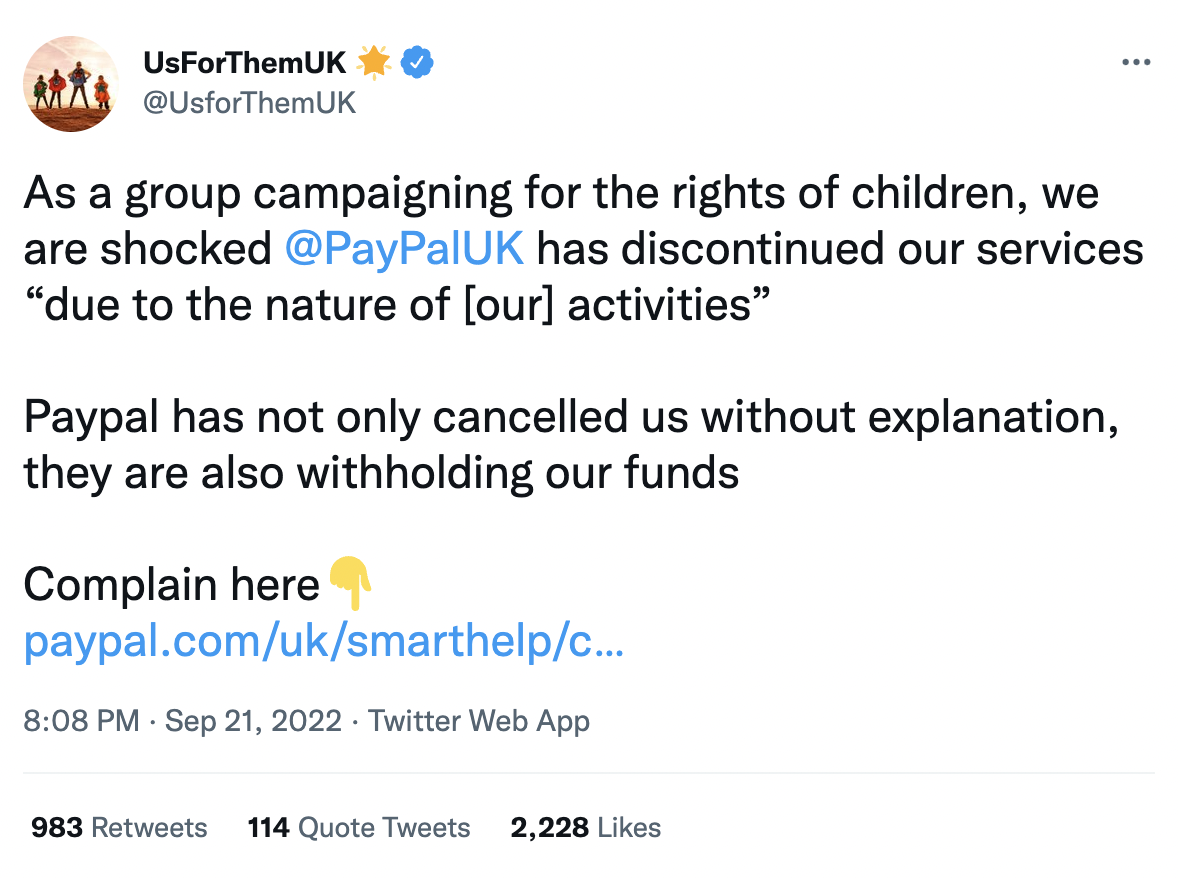Slate Accidentally Makes The Case For The Parallel Economy
I don't often find myself sharing articles from Slate, but as Dan Bongino has pointed out multiple times on his show, sometimes the liberals accidentally say the quiet part out loud. Although, in many cases, they say it out loud on purpose, because they know there will be no repercussions and they just assume that everyone reading / listening / watching will naturally agree with their tyrannical infringements on the rights of their fellow Americans.
This article from Slate is like a history lesson on the reasons why there is a burgeoning #ParallelEconomy today. It methodically documents infringement after infringement, cancellation after cancellation, just walking their readers down the path of Parallel Economy formation. The disgusting part to me is that they presume that everyone will naturally agree that it was just necessary to cancel "this platform" from Amazon Web Services. It was only proper to cancel "that person" from PayPal. It was a necessity to cancel "that company" from Stripe. It goes on and on and on...
The author speaks with disdain regarding Gab's concept of free speech, "If it's legal speech, it's allowed on the platform." How is that controversial? I seem to remember when I joined the Navy, I took an oath to uphold and defend the Constitution. I feel like I remember Free Speech being in there somewhere. But, apparently these days, running a platform that upholds the First Amendment to the Constitution is grounds for being removed from all means by which to obtain income.
Gab got the Parler treatment before most people ever heard of Parler. That's one of the reasons I have a lot of respect for Andrew Torba, even though he "seems" to to pick fights with other folks in the Parallel Economy. Andrew had to rely on the Parallel Economy before it really existed. Where he was unable to find alternatives, he had to build them on his own.
Anyway, this article is written from a standpoint that goes a little something along the lines of, "We gotta watch out for these Ultra MAGA folks... We keep cancelling them from major platforms, but now they're building their own stuff and not relying on us anymore..." Of course they managed to tie in this stupid New York shooting into this article as well. Strangely they did this, and blamed Alt Tech / Parallel Economy, despite the fact that the shooting was live streamed on Twitch, which is a tech platform owned by Amazon... WTF?? How does that even work? So... Gab had to be deplatformed / cancelled because a guy posted a message on their platform prior to shooting up a synagogue, but Twitch doesn't get deplatformed / cancelled after a psychopath literally livestreams mass murder on their platform? Anyone see any bias here? The same holds for Parler. They got the boot after Jan. 6, but there was plenty of planning for that which took place on Facebook / Twitter (actually more), but only Parler got cancelled... Yeah, we all see how it is...
You probably won't agree with a lot of the political statements in this article, but it's worth a read if for no other reason than to remind yourselves just how we got into the situation we now find ourselves and why we Absolutely MUST build Parallel Economy Alternatives to every liberal-biased platform that we used to assume we could rely on.
Here's a snippet. There's a link at the bottom if you want to read the whole article as well as a promo code to get you a free 1 month subscription to get past the pop up.
On Oct. 27, 2018, a mass shooter killed 11 people at the Tree of Life synagogue in the Squirrel Hill neighborhood of Pittsburgh. The shooter, Robert Gregory Bowers, was an active user of Gab, an alternative online social media platform favored by the far right where he posted nativist and antisemitic content. “Screw your optics, I’m going in,” Bowers wrote a few hours before commencing the attack. Bowers’ posts on Gab soon attracted media attention, and that’s when Gab’s founder and CEO, Andrew Torba, realized he had a serious problem.
With an estimated 800,000 users, Gab was one of the fastest-growing alternative-tech, or “alt-tech,” platforms on the internet at the time. It had also become infamous for serving as a haven for extremists motivated by racial and ethnic violence, due in large part to Torba’s philosophy about free speech (which has been echoed recently by Elon Musk in discussing his plans for Twitter, should his purchase go through): If it’s legal, it’s allowed. But for several of Gab’s key business partners, the Tree of Life shooting was a bridge too far. In response to the massacre, payment processors PayPal and Stripe announced a day after the shooting that they would ban Gab from their platforms. Gab’s web host, Joyent, and the domain name registrar, GoDaddy, followed suit, forcing Gab offline for a week.
Until that point, the promise of monetizing a new online ecosystem designed by and for conservative and far-right movements had electrified proponents of the alt-tech approach to online platforms. Along with Gab, platforms like Parler and Rumble were early experiments in blending the design features of mainstream services like Facebook and Twitter with an anything-goes attitude toward content moderation. But when major payment processors cut Gab off for good after the Tree of Life shooting, the viability of the alt-tech business model itself came into question.
Torba resolved his domain issue by switching to Epik, a Seattle-based domain registrar and web hosting company. Gab’s exile from mainstream payment processors, however, proved to be a stickier wicket, and one that cost the company significant revenue. In a Securities and Exchange Commission filing that December, Gab reported that losing access to applications for PayPal and Stripe “has resulted in a 90% decline in payments for our subscription services.”Torba is not the only alt-tech CEO to experience the whiplash of early startup success and a precipitous fall from grace after running afoul of the terms of service provided by backend infrastructure tech companies. After the Jan. 6, 2021, attack on the Capitol, a similar pattern played out when tech providers, such as Amazon Web Services, deplatformed Gab’s alt-tech competitor Parler, shutting down the site for a month. Nor is the problem of building independent digital infrastructure limited to politics. The marijuana industry, for example, has long operated in legal gray areas that have forced suppliers to roll out their own tech and payment options.
For many on the political right, Amazon’s decision to pull hosting for Parler following the Capitol attack was a clarion call to build a parallel web, and prominent players—including Trump’s own companies—have since flocked to the task. But in 2018 and 2019, movement leaders were still discovering how vulnerable their dependence on mainstream services rendered them.
Promo Code "PARALLEL" = 1 Free Month Subscription to get past the popup
LINK:
https://slate.com/technology/2022/05/alt-tech-internet-extremists-financial-ecosystem.html


















